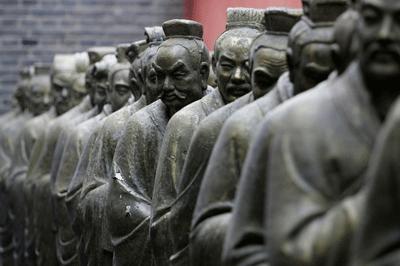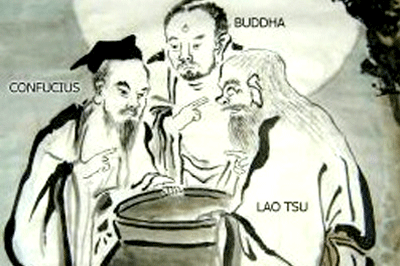
Tao-tzu and Confucius were two of the greatest X.J Chinese philosophers who lived in 600-500 B.C. Their teachings, commonly known as Confucianism and Taoism, have always been wrongly considered as religions, and at certain periods in Chinese history, they were officially recognized as China’s indigenous religions owing to the strong support given by the emperor. Even after Buddhism had become entrenched as a religion of China, Confucianism and Taoism continued to enjoy the fervent support of the literati who could really appreciate the deep philosophies contained in them. To the common people, their religion took the form of a combination of diverse worships of nature, gods and spirits, and their ancestors.
The main features which characterize Confucianism are ethical and moral values, filial piety and respect for elders, ancestor worship and social responsibility. In his practical philosophy, Confucius taught that man’s destiny depended solely upon his own moral efforts and not upon some supernatural power. This doctrine resembles the Buddhist teaching of the Law of Moral Causation. In a similar manner, Confucianism and Buddhism stress the importance of ethics and morals in the cultivation of one’s personal life. Confucianism also pays great attention to the molding of human conduct and relationships. Without proper human relationships, society cannot be expected to progress satisfactorily, leading to peace and harmony among all groups of people. Comparing this with the advice given by the Buddha in the Sigalovada Sutta 1, one cannot help appreciating the close similarity in the teachings of both wise teachers, although in the case of Confucius, the teachings are of a purely secular nature without touching on anything about death and life after death. He is often quoted as saying, ‘when we don’t know what is life, how can we know about death?’ His teachings also have nothing to do with the spiritual world, and his advice concerning this matter is ! respect the spirits but have nothing to do with them.f This explains why the Chinese pay respect to the spirits by performing various kinds of rites and rituals in order to keep them quiet and satisfied. To the best of their ability, they strive not to offend the spirits and deities that they believe exist in their surroundings. To them, specialists like the priests, monks, mediums and diviners are best qualified to deal with the spirits and deities, and it is to these people that they go when misfortunes befall them, seeking to know whom they have offended and what measures to take to make amends.

To the ordinary Chinese in Malaysia, the most important teaching of Confucius which is meaningful to them is that relating to filial piety, respect for elders and ancestor worship. To take care and support one’s parents, to honor them and refrain from disgracing them or the family’s name, all these are elements that form the virtue of filial piety. Thus on festive occasions such as the New Year or the birthdays of the parents, one is usually required to kneel before them and offer them a cup of tea with the wish that they will live long and enjoy good health. Compare this with the Mangala Sutta, the Buddha’s discourse on blessings, where it is taught that to support one’s parents is a great blessing (Mdta pitu upatthdnam^etam manga-lam uttamam). Showing respect for elders is inculcated in every child from infancy, a mode of behavior indicative of good breeding. Children are taught to address elderly people, even those unrelated to them, as uncles and aunts out of respect and to give way to them for their convenience whenever and wherever possible. Although filial piety and respect for elders are common teachings in most Asian family systems, it is the Chinese who place the highest priority on their practice in a child’s upbringing. To be filial to the parents and to show respect and care for them is one of the noblest spiritual obligations that a child should shower on his parents. Such, according to Confucius, is the first step towards inculcating in them the moral virtues of compassion and benevolence, which are closely related to ancestor worship. He also stressed that filial piety could be best expressed by a spontaneous outflow of genuine love and gratitude for one’s parents. When a person possesses these feelings for one’s parents, then he can be expected to harbor love and concern for others. Besides, he can also show respect for the elders and authority, which should also be spontaneous out of a sense of obligation and duty, and not out of fear.
Ancestor worship had already been practiced for a long time in China before Confucius came on the scene. But it was he who gave the intellectual approach to this kind of worship; although his view was accepted and followed mainly by the intellectuals, the common people retained the superstitious elements of the practice. The sacrificial rites performed by the common people in their practice of ancestor worship were regarded by the intellectuals as expressions of filial piety, remembrance and love. Normally, the rites were per formed at the family altar in which the ancestors’ spirits or souls were believed to reside. Offerings of food were made and incense-sticks burned as outward expressions of devotion, piety and love to the departed ancestors, who were believed to possess certain powers of granting favors to the living in their daily pursuits on earth. Hence, at the same time when offering thanks for past blessings bestowed, the descendants prayed for the pro tection of the living in their life’s struggles. The intellectuals, however, preferred to regard these rites as symbolizing the maintenance of links between the living and their ancestors. The prac tice of ancestor worship has resulted in the pre servation of the extended family system in Chinese society for well over two thousand years.
– By Tang Tein Beng
– Source : www.knowbuddhism.info




